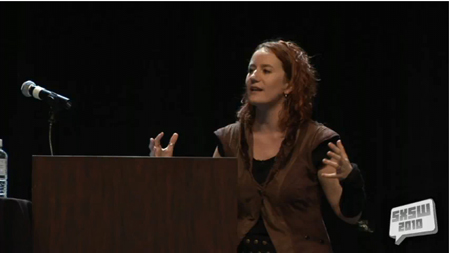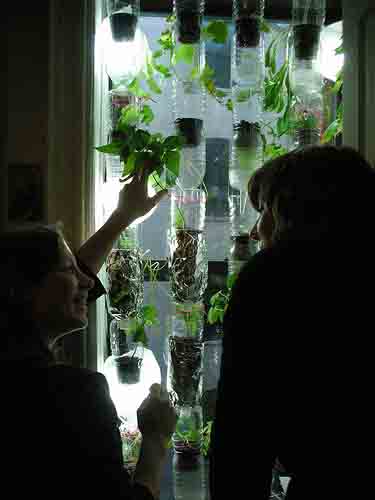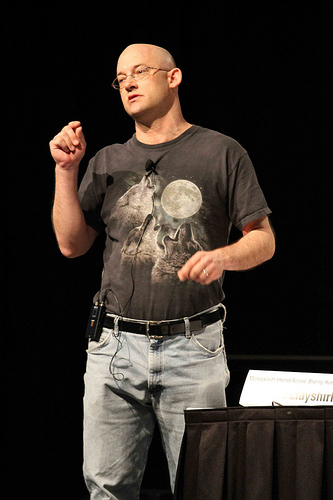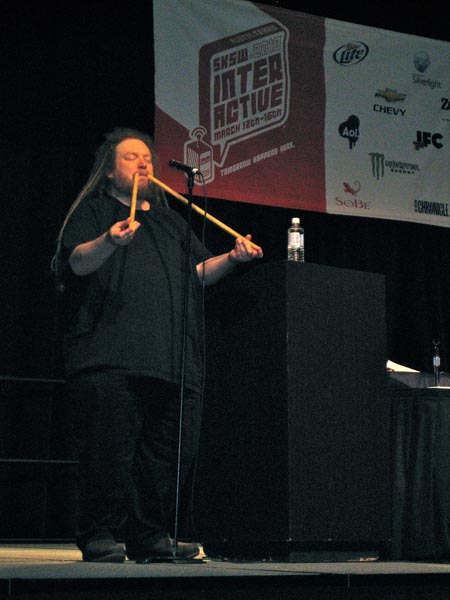
Now that everyone is out of business cards and has had enough time to check in to their locative media apps, I think we can begin to make sense of the social and technological deluge that was the South by Southwest Interactive festival. After being deep in a web development hole for the past few months, what I took away from the conference was a rejuvenation of critical, big-picture questioning, a reminder of just how drastically technology is contouring contemporary society and culture and that, ultimately, it is still in our hands to determine the overall shape of things to come. Although a late arrival and scheduling conflicts prevented me from hearing everyone I'd have liked to have heard (Douglas Rushkoff, Gary Vaynerchuk, among many others), I was able to take in most of the keynote speakers and the panels whose subject had some impact or connection to the arts (which were few). Here is a synopsis of the projects, presentations, and people that resonated with me the most.
Funding Your Projects from the Crowd - Moderated by Robin Sloan, this panel brought Perry Chen from Kickstarter, Britta Riley from Windowfarms and Jenna Wortham from the New York Times together to talk about how to use the web to raise funds for creative projects, mainly using Kickstarter. Kickstarter is a microfunding website that helps people realize their creative projects by providing a simple online space to mobilize a community of supporters. Both Sloan and Riley are Kickstarter success stories, as Sloan was able to raise four times his base $3,500 funding goal to help him write a book. Riley said that she had a difficult time securing grants from art institutions due to the unconventional nature of her WindowFarms project, but was able to raise over $28,000 via Kickstarter. She also mentioned that using Kickstarter enabled her to devote more resources to the actual project itself instead of having to invest time and money into developing a website capable of handling online payments. Kickstarter is currently in Beta and still invite only, as they are finalizing the best methods for helping people's projects succeed. But, once it leaves Beta, it will prove very valuable for artists to accomplish projects that may require extra funding or don't fit within the requirements of many arts grants.

openFrameworks: A Powerful Creative Coding Library for Artists - I was very happy to see the openFrameworks team presenting at SXSWi, and from the panel's Twitter stream, it was obvious that they were making lots of new fans. openFrameworks is an open source code framework for the development of creative applications. Explicitly written for artists and those without a deep computer science background, openFrameworks has a simple syntax and, since it's built on C++, it's very powerful and quite fast. If you are familiar with Processing, then basically openFrameworks is to C++ what Processing is to Java. The presentation itself was excited and spirited, and, notably, the openFrameworks team were probably one of only a handful of panelists who used the word "art" in their presentation or who were thinking about using technology in creative ways. For artists, there is tremendous promise with openFrameworks, as it's ideal for creating robust interactive installations or manipulating media. Like Processing, it's sure to open up the world of creative coding to a whole new audience.

Interactive Infographics - Organized by Casey Caplowe of GOOD Magazine, and featuring Ben Fry, Shan Carter and Eric Rodenbeck, this was a true panel of all-stars in the field of visualizing information. The first half of the panel consisted of presentations by each panelist, and all showed examples of how to elegantly communicate relationships and trends in large and complex data sets. The common design imperative among the presenters was to let the information tell its own narrative, and to not let design impede on what the information has to say. Take the above example offered by Ben Fry, which simply maps water consumption (namely toilets flushing) in Canada during the Gold medal Hockey game between the US and Canada during this year's Olympics in Vancouver. As you can see, people were holding more than their breath. The Q+A session provided insights into the current state of the data visualization field, which all agreed was nascent and soon due to branch out into mobile devices and as well as real time visualizations. I was particularly pleased to hear Shan Carter speak of the push to find non-Flash solutions for visualizing information on the web, which opened up a positive conversation about the prospects of HTML 5 canvas tag and the still-in-development processing.js library, which Mozilla has been helping take form. Below is a list of works mentioned:
Good:
http://www.flickr.com/photos/goodmagazine/sets/72157618896371005//show/
NYT:
http://www.nytimes.com/interactive/2010/02/09/sports/olympics/2010-olympics-venue-map.html
http://elections.nytimes.com/2008/results/president/votes.html
http://www.nytimes.com/interactive/2009/02/02/sports/20090202_superbowl_twitter.html
Ben Fry:
http://benfry.com/traces/
http://benfry.com/writing/archives/52
Stamen:
http://stamen.com/projects/crimespotting
http://content.stamen.com/
Danah Boyd - "Making Sense of Privacy and Publicity" - This year's opening keynote speaker, scholar Danah Boyd, got the festival off to a critical start by addressing the challenges of publicity and privacy on the web, particularly in relation to the multiple dimensions of social networks. She used the recent privacy gaffes by two major players on the Web, Google's Buzz debacle and the failure of Facebook's updated privacy settings, to point out the disconnect between these companies' understanding of their users's online social networks and the reality of social relationships. Boyd noted that both of these examples demonstrate how too often companies use the information they have about their users to make superficial assumptions about their user data, decisions that ignore the complexities of social relationships. She broke social networks down into 3 categories: personal (people who are actually close to you), behavioral (those who you frequently or infrequently contact), and articulated (those listed in an address book or on a list of friends). With Buzz, Google collapsed our articulated and behavioral networks into what they assumed was our personal network with a complete disregard to social context, resulting in many false connections for their new Twitter-like feature. Facebook's failure to create transparent privacy settings and their decision to publicly display user information by default, as opposed to letting the user decide what is and isn't public, was a serious breach in their user's trust, as suddenly people were posting what they thought was private information publicly. Boyd reminds us that, despite the rumors, privacy isn't dead and should be re-understood as a matter of user control, where we should work to maintain control of our information and our online identities. Here is a link to her speech: http://www.danah.org/papers/talks/2010/SXSW2010.html

Clay Shirky - "Monkeys with Internet Access: Sharing, Human Nature, and Digital Data" - Clay Shirky focused on the topics of sharing and abundance and how these ideas relate to the progression of the internet and, ultimately, the greater social good. Shirky made distinctions between three types of sharing, the sharing of goods, the sharing of services, and the sharing of information, and noted that we are less likely to share goods, more likely to share services, and almost always likely to share information. Sharing information is so easy, in fact, that we feel good when we do share information and it's considered socially spiteful not to share information. These insights help explain why the music/media industry is failing, as music turned from goods/commodities (records/tapes/cds) into information (mp3), and it became rewarding for us to share music among friends and online. They also explain internet phenomena like the growth and effectiveness of Linux and Wikipedia. Shirky also proposed the idea that "abundance breaks more things than scarcity", that is, we as a society know how to handle a lack better than we know how to handle plenitude. Abundance is the primary force currently breaking the old models, producing new models and creating new opportunities for organized groups to make political and economic impacts and contribute to social good. Shirky wrapped it up by saying "Used to be, you could do little things for love, big things for money. Now you can do big things for love, too."

Jaron Lanier -The Yin to Shirky's Yang, author Jaron Lanier dove into the dark sides of collectivism, online identity, Web 2.0, and Free Culture. Lanier laid out some very compelling arguments. For example, the combination of the anonymous nature of the web and the participatory nature of web 2.0 designs all too often results in people indulging in negative behavior (racism, bullying, sexism, etc). He said that Web 2.0 designs, in particular those sites that encourage users to provide or create unfettered and anonymous commentary, provide not just an outlet for negative actions, but also the motivation to pursue them as they snowball into mob and herd behavior. Lanier asserted that these negative results, for example, racist or hateful comments on YouTube, are far more present online than the positive results like Wikipedia. Lanier also apologized for helping lay the foundational thinking behind the Free Culture Movement, as he believes it's created a whole class of creative and artistic people who’ve been giving their work away for free but are now unable to reap any rewards from what they’ve created, and instead forced to capitalize on the peripherals of their work (i.e., the musician makes money from the t-shirt rather than the music itself). As technology progresses, he asserts, so will the means for people to freely distribute the peripherals (everyone will one day have a t-shirt making machine, so there will be no need to buy the t-shirt), leaving the artist with nothing to gain from their labor. He calls this "Digital Maoism" due to this subjugation of the creative and/or intelligent class. Lanier envisions a future where artists are able to make a living of their work without having to devote most of their time and energy to marketing and public relations. While I think the connection with Maoism is tenuous at best and the term "Digital Maoism" feels more like a means of causing a stir, Lanier’s sentiments ring loudly as it’s an unfortunate truth that artists today, especially those whose work involves or becomes digital media, have to be extra creative and energetic in order to find some economic means of sustaining their work, usually at the expense of focusing on the work itself.
Another issue brought up by Lanier is how the addictive and performative nature of web 2.0 technologies impairs self-reflection and reinvention in young adults and teens. Lanier stated that sites like Facebook are nice if you're over 25 and have a social history to mine, if you're 15 then Facebook functions more like a continuous performance space where teens must constantly reinforce a superficial identity and navigate immature group dynamics, leaving no time for the introspection, self-cultivation, and self-invention (or reinvention) needed to become a real adult. Lanier posed the question if Robert Zimmerman had a Facebook profile, would he have internalized Woodie Guthrie, moved to Greenwich Village and renamed himself Bob Dylan? Probably not, he says, as everyone would know or find out he's that Zimmerman guy from Michigan. To wrap things up, Lanier played a rare wind instrument from Eastern Europe that he said has no documentation on Wikipedia or anywhere online, reminding us that "you can't learn everything online".

Bruce Sterling - As is customary, Sterling closed out SXSW and this year's presentation was the great sobering moment for the festival. Sterling's every sentence felt like a deliberate, sagacious, and caring punch to the guts, and his careful pauses gave you just enough time to consider things before the next blow arrived. Early on in his speech, Sterling praised the generation know as the Millennials for being such a well-behaved and optimistic group, despite the fact that there are two land wars and a global economic crisis. This set the tone for the majority of his speech, which was by and large a call for the tech community to wake up and, more importantly, speak out against the problems of the world instead of "networking while Rome burns". One day, Sterling said, the upcoming generation of digital natives is going to turn on us and criticize everything we've done so far, especially for the unintended consequences brought from our efforts. Our tech buzzwords will be used against us to epitomize all the damage wrought from our tendencies to kluge and hack things together just so we can keep up to speed with technology and one another. Instead of ignoring them, it will be our moral duty to help them and work with them. Like Lanier, he also questioned the motivations behind Open Culture. Instead of focusing on demonizing and freeing up the media, which has certainly contributed to the economic collapse, why haven't we created open-source food and shelter? Sterling then spoke at length on Cassandra, the tragic prophet from Greek Mythology, whose disastrous premonitions went ignored because of her low social position (she was a sex slave) and the fact that she only told her prophecies to the people she hated or who she claimed would suffer the worst. It should come as no surprise, then, that she was killed for what she had to say. Sterling notes that if she had social media, however, she probably would have been closely followed by Socrates, who knew how to put people in situations where the truth ends up standing plainly and obviously before them, and could have retweeted her posts. "It could have been a beautiful relationship", he noted. The message? Figure out how to get your game-changing thoughts or projects into a form or a situation that can actually enact change, or pass them on to someone who can.
Nick Hasty is Rhizome's Director of Technology

